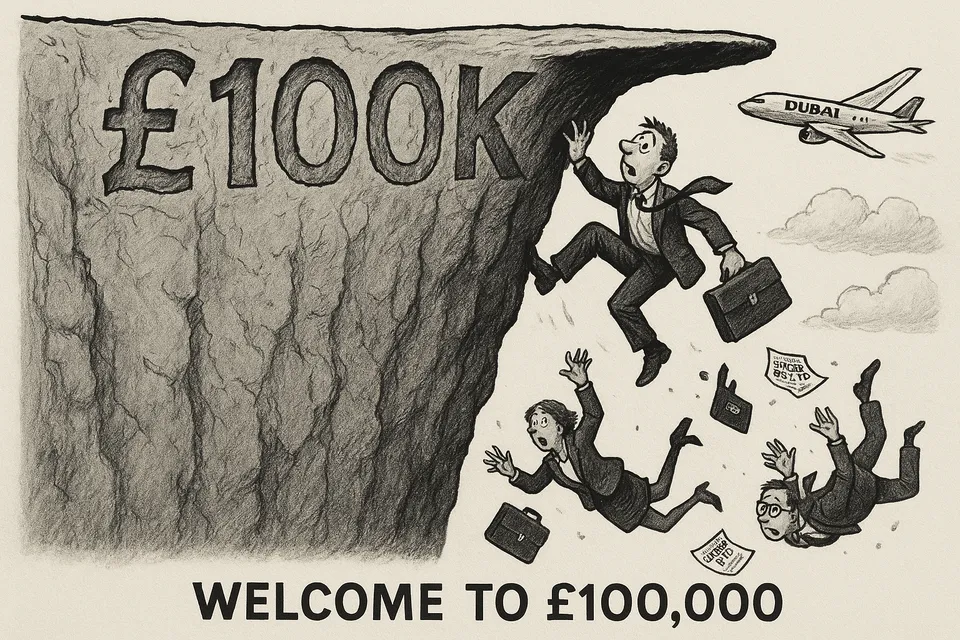The £100,000 Trap: How Britain Built a System That Punishes Success

Only in Britain Earning £100,000 Makes You Poorer
The mathematics of modern Britain reveal a peculiar achievement: we've constructed a tax system where earning £99,999 leaves you better off than earning £149,000. This isn't a quirk or an oversight. It's the logical endpoint of a state apparatus that views productive citizens primarily as revenue sources to be squeezed, rather than assets to be cultivated.
The Standard’s Alice Cockerell has documented what happens when London professionals cross the £100,000 salary threshold. They enter a twilight zone of fiscal punishment where every additional pound earned between £100,000 and £125,140 faces an effective 60% tax rate. Add two young children to the equation, and the arithmetic becomes surreal: nursery fees of £3,000-5,000 monthly, loss of free childcare hours, and removal of tax-free childcare benefits combine to ensure that earning more means having less.
This isn’t theoretical. Real professionals are discovering that promotions make them poorer. One digital strategy director interviewed states bluntly: “We would be much richer if I made £99,999.99. The day I was given a raise was the day we went broke.”
Meanwhile, the assets these earners might aspire to own have detached from economic reality. A four-bedroom terraced house in Peckham or Walthamstow - hardly Belgravia - now commands £1 million, double the price from a decade ago. Private school fees, post-Labour’s VAT raid, hit £10,000 per term. A week’s holiday in Cornwall for a family costs £3,000.
Critical Analysis: The Productivity Punishment Machine
What we’re witnessing isn’t merely bad policy - it’s the systematic dismantling of incentives that once made Britain function. The top 10% of earners contribute 60% of all income tax revenue. These are the doctors, engineers, tech professionals and business leaders whose skills and productivity supposedly matter to a modern economy. Yet the system is explicitly designed to ensure they can never accumulate capital or security.
Consider the perversity: Britain needs these professionals to work long hours in demanding jobs, to innovate and produce. Yet it ensures they remain perpetually insecure, unable to buy property, forced to rely on parental help, considering emigration. The state extracts maximum revenue while providing deteriorating services - a wealth destruction machine disguised as a tax system.
The comparison with competitor nations is stark. In Singapore, the same £100,000 salary faces 11.5% tax. In Dubai, zero. Even within Europe, the UK’s treatment of its productive class stands out as uniquely punitive. Is it any wonder that London’s professionals speak constantly of escape?
This isn’t an isolated phenomenon. It’s part of a broader pattern where every aspect of British life is optimized for extraction rather than growth. The static GDP since 2020 that Cockerell mentions isn’t a temporary blip - it’s what happens when you build an economy on taxing productivity rather than encouraging it.
The generational comparison is revealing. These professionals’ parents could afford homes, private schools, and security on similar relative salaries. The system that enabled that prosperity has been systematically dismantled, replaced by one that views success as something to be penalized rather than rewarded.
Labour’s autumn tax rises will intensify this dynamic. When your economic model depends on squeezing an ever-smaller productive base ever harder, the endpoint is predictable: they leave. Singapore, Dubai, and the US aren’t just offering lower taxes - they’re offering a basic proposition that Britain has abandoned: work hard, succeed, and you’ll be rewarded rather than punished.
What This Really Means
The “Henrys” aren’t asking for sympathy. They’re providing a case study in how advanced economies destroy themselves. When earning more means having less, when success is punished, when the most productive citizens are treated as cash cows rather than assets, decline isn’t just possible - it’s guaranteed.
The professionals interviewed aren’t planning their futures in Britain. They’re discussing Dubai salaries, Singapore tax rates, and American opportunities. The interior designer whose mother pays her council tax, the auction house director who can’t afford European holidays, the TV executive priced out of private schools - these aren’t sob stories. They’re documentation of a system eating itself.
Britain has achieved something remarkable: creating conditions where its most productive citizens are financially better off earning less, and geographically better off leaving entirely. No amount of political rhetoric about “growth” or “productivity” can disguise this fundamental reality.
The Bigger Picture
The £100,000 tax trap perfectly encapsulates modern Britain’s approach to governance: maximum extraction, minimum return, perverse incentives, and institutional blindness to consequences. It’s a system that views its most productive citizens not as the foundation of prosperity, but as problems to be solved through ever-more-creative taxation.
When the professionals who generate the majority of tax revenue conclude that success in Britain is a mug’s game, when they start leaving for jurisdictions that reward rather than punish achievement, the trajectory becomes clear. This isn’t about privileged people complaining. It’s about a nation methodically dismantling the incentives that make advanced economies function.
The Henrys aren’t the problem. They’re the canaries in the coal mine, documenting in real time what happens when a state forgets that prosperity must be created before it can be redistributed. Their struggles aren’t a glitch in the system - they’re exactly what the system is designed to produce: a professional class too squeezed to accumulate capital, too insecure to challenge the status quo, and increasingly likely to take their talents elsewhere.
Britain hasn’t just failed its high earners. It’s built an economy that actively punishes the behaviors - innovation, productivity, success - on which its future depends. The only surprise is that anyone still plays along.
Commentary based on The Henrys struggling on £100k a year (yes, really) by Alice Cockerell on The Standard.